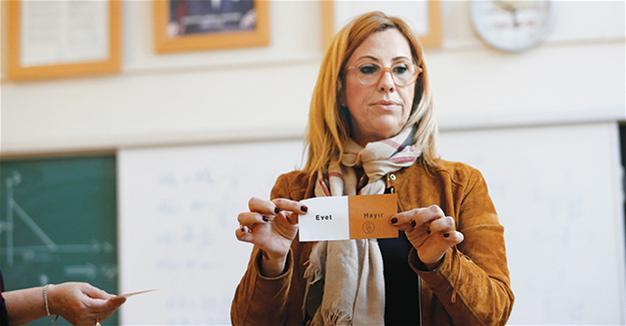8 questions on the ongoing debate over ‘unsealed votes’
Oya Armutçu - ANKARA

REUTERS photo
1. Which envelope and ballot papers should have been deemed invalid according to the Election Law?In 2010, the election law was amended to mandate the sealing of envelopes.
According to Article 98 of the law, “envelopes” which are not in the form and color which is given by the Ballot Box Committees (BBCs) and on which there is no seal from the Provincial Election Boards (PEBs) and BBCs are deemed invalid. According to Article 101 of the law, the “ballot papers – split ticket” which do not have the seal of the BBCs are invalid.
2. Are there any decisions that have been taken according to this law?
In the 2014 local elections, Peace and Democracy Party (BDP) candidate Mehmet Emin Özkan won the election over Justice and Development Party (AKP) candidate Hüseyin Mutlu by 32 votes. The AKP objected to the election.
The Bitlis Provincial Elections Board, which determined that there was no seal on the envelopes used in one polling station, decided to cancel the election and hold a re-election on June 1, 2014.
3. What is the significance of the YSK taking the decision as the process of vote-counting was ongoing?
The decision that the YSK took despite the open provision of Law No. 298, as well as its open declaration of the decision, is critical.
Since this decision was taken while the counting was still continuing, the BBCs immediately counted the unsealed votes and envelopes and added them to the “valid” votes. Thus, the possibility of identifying the number of unsealed envelopes and ballots in official reports is impossible.
4. How did the YSK head defend the decision?
“The YSK has not taken this decision for the first time. Dozens of its decisions, such as in 1990, 1994, 2004 and in similar cases, ruled that votes could not be voided due to the formal inefficiency of the BBCs,” said Sadi Güven, the head of YSK, defending the decision. The examples he presented were decisions dating back to a legal amendment in 2010.
5. Does this decision block the objections?
According to the main opposition Republican People’s Party (CHP) YSK representative Mehmet Hadimi Yakupoğlu, this decision closes off the right to appeal. The rule was changed while the counting was continuing in spite of the open provision.
All of the decisions made so far have been concluded after the BBCs completed the counting process and the votes were deemed either valid or invalid, with the situation being recorded. The YSK evaluated the votes and determined whether the changes “would change the election result.” This time, the YSK decided that the votes were valid while the counting was continuing. If the process had proceeded as it had previously, the BBCs would have classified the sealed and unsealed ballot papers and recorded the numbers. The YSK would have been asked for a final decision after the District Election Boards and Provincial Election Boards had made their decision.
6. Can the YSK decisions be appealed to the Constitutional Court?
YSK decisions are definitive, and there are no legal procedures to appeal to the Constitutional Court. The court has previously rejected appeals concerning the decisions of the YSK, stating that it is not within its jurisdiction and that the decisions are “definitive.”
7. Has the Constitutional Court ever made a decision regarding unsealed envelopes and papers?
In a previous statement from the Ankara Bar Association, it was stated:
“As a matter of fact, in the decision of the Constitutional Court dated 06/02/2014 on Individual Application No. 2013/3912, it is mentioned that unsealed ballots would be deemed invalid even in the election of profession chambers. In this manner, it cannot be lawful for the YSK to ignore this prescriptive statute of justice for any reason.” The lawyers and Ankara Bar Association argue that this decision sets a precedent.
8. Is there any possibility that the referendum will be canceled?
This subject is completely within the authority of the YSK. Even though legal professionals have called for a cancelation, it is seen as unlikely that the YSK will take such a decision.
















